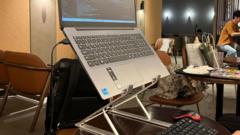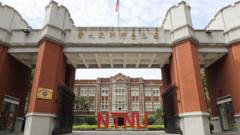As cafés in affluent South Korea struggle with students taking over tables for hours, Starbucks has implemented guidelines to manage space without alienating patrons. The cultural phenomenon of 'Cagongjok'—a term for students and job seekers using cafés as study spaces—sparks mixed reactions within the community, highlighting the need for more inclusive solutions to accommodate these users.
South Korean Cafés Tackle the Rise of 'Cagongjok': Balancing Space and Study

South Korean Cafés Tackle the Rise of 'Cagongjok': Balancing Space and Study
Cafés in South Korea face challenges with students and workers who occupy tables for extended periods. New guidelines from Starbucks Korea aim to address this growing trend while maintaining a welcoming environment.
In the upscale area of Daechi, Seoul, café owners are confronting a growing trend of patrons who contribute to a phenomenon dubbed 'Cagongjok,' where mostly young individuals occupy cafes for study or work for extended hours. One café owner, Hyun Sung-joo, recently encountered a customer who set up a makeshift office with two laptops and a six-port charger, claiming their space for an entire day. In response, he decided to block off some power outlets to prevent monopolization of resources.
The trend of Cagongjok, particularly prevalent in neighborhoods with a high concentration of students and office workers, has drawn the attention of Starbucks Korea. The coffee chain has announced new guidelines in an effort to curb extreme cases seen during peak hours, where individuals bring in bulky equipment like desktop monitors or occupy tables for significant periods of time, leaving them unattended.
Starbucks has pledged to guide customers instead of enforcing strict eviction policies, citing instances of theft when personal belongings are left unsupervised. In recent visits following the policy announcement, several patrons were observed with standard laptops, though some continued to leave their tables for extended periods, indicating the difficulty of fully enforcing the new guidelines.
Reactions to Starbucks’ decision have varied. Many patrons welcome the new rules as necessary for restoring a more balanced café environment, expressing grievances over limited seating and the often heavy work atmosphere. Detractors, however, view these measures as excessive and an abandonment of the café’s traditionally relaxed ambiance.
This cultural conversation regarding Cagongjok mirrors broader societal discussions in South Korea. Surveys reveal that a significant portion of Gen Z job seekers study in cafés weekly, highlighting a growing reliance on these spaces as alternatives to libraries or homes, which may not always provide suitable environments for focused work.
While some independent café owners have embraced Cagongjok, facilitating students with amenities like power outlets, others have enforced stricter policies, such as limiting study time to two hours to mitigate conflicts among patrons.
The phenomenon has roots in South Korea's competitive societal structure, as noted by Professor Choi Ra-young from Ansan University. She suggests that limited public study spaces contribute to students' reliance on cafés. Yu-jin Mo, a café patron, expressed how the café environment offers her a sense of safety and belonging during a challenging upbringing.
Professor Choi advocates for more inclusive guidelines that effectively accommodate the needs of students and workers without compromising the social atmosphere of cafés. As the discussion around Cagongjok evolves, it becomes clear that sustainable solutions must balance the interests of all café patrons.



















